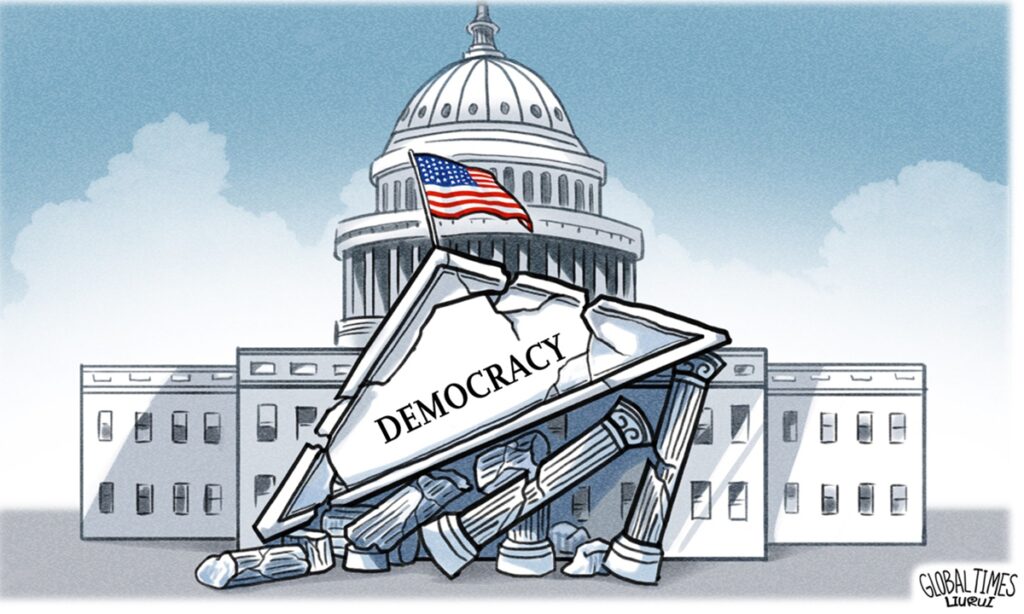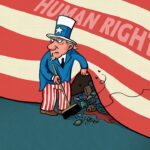US’ party politics is further moving toward degradation and radicalization. The weaponization of the judiciary has gravely undermined its independence, which is considered a source of pride in democratic politics in the US and the West.
Officials in New York and Washington, DC, are preparing for potential protests as a grand jury empaneled as part of the investigation into former US president Donald Trump’s alleged role in a scheme to pay hush money to adult film star Stormy Daniels continues to weigh possible charges, according to CNN on Tuesday. Over the weekend, Trump called for his supporters to protest his expected indictment, leading to concerns that the Capitol riots will repeat.
Apart from the charge in the Daniels case, Trump is also facing legal problems such as his role in the Capitol attack on January 6, 2021. The timing of the indictment, at the start of a new election cycle, conveys the message that some political forces in the US are concerned about Trump’s continued presence in the country’s political arena, racking their brains to deprive him of his candidacy, said Shen Yi, an international relations professor at Fudan University.
In Western political theory, party politics should be limited within a certain range. Multi-party and partisan systems in the West inevitably involve struggles between parties. The rules of the game allow for political rebuttal of opposing views and boycotting votes during the policymaking process, but the judicial mechanism is not used as a weapon. The Trump case mirrors that the application of the judicial mechanism has already gone beyond the boundaries of normal party politics, and the political game no longer adheres to ethics.
Reuters said on Monday that it is a case that would be a historic first as no current or former US president has ever been criminally charged. This fully demonstrates that the US’ partisan struggle has turned white-hot. The American political system has become highly pathological.
Despite having stepped down, Trump’s remarks still have considerable inflammatory power, which indicates that the American public is highly dissatisfied with the current establishment elites. As a result, they tend to support anti-establishment candidates; thus, radical and populist politicians like Trump are pushed to the center stage of politics.
The damage that Trump has caused to both US-China relations and US’ domestic politics has been substantial. After Trump’s four years in office, US’ partisan strife has been exacerbated and political and social division has been difficult to reconcile. But political figures like Trump grow out of the deteriorating and pathological political soil in the US. Essentially, it’s the US democratic system that has gone wrong.
Today, the US repeatedly tarnishes the word “democracy.” In a bid to gain more votes and win the election, the infighting within the two parties has brought disorders to American politics and policies, ranging from the deterioration of political violence, the unprecedented severity of political polarization, rampant money politics, to the freedom of speech being in name only.
Facts have proven that the maladies of American democracy have penetrated all aspects of politics and society, further reflecting the governance failure and institutional defects behind it. The greatest tragedy of American democracy is that it has lost the ability to reform and address major problems, and the US is running, but no one is truly responsible for solving problems.
Even so, the US is still obsessed with the narrative of “democracy versus authoritarianism,” using ideology and values as tools to suppress other countries and promote geopolitical strategies under the banner of democracy. In recent days, Washington has begun to promote the second so-called Summit for Democracy which is to be held at the end of March. Given what has happened and is taking place in the US, the country is not qualified to be the global leader in democracy and the so-called Summit for Democracy is doomed to be fruitless.
(Global Times)




